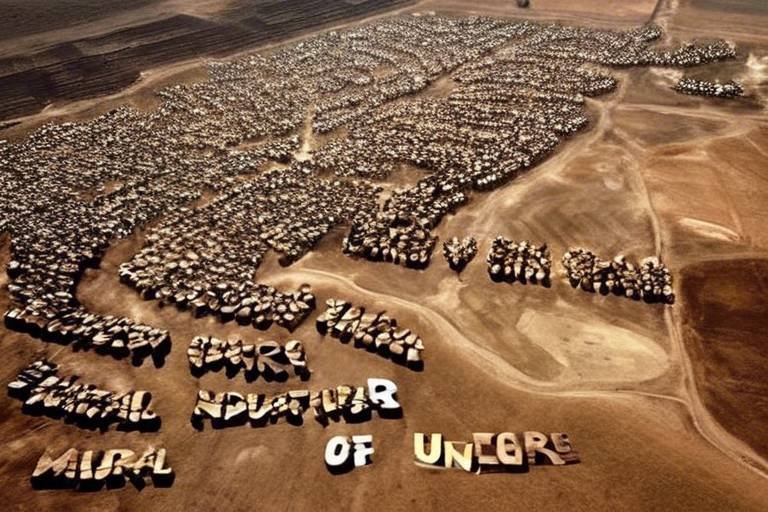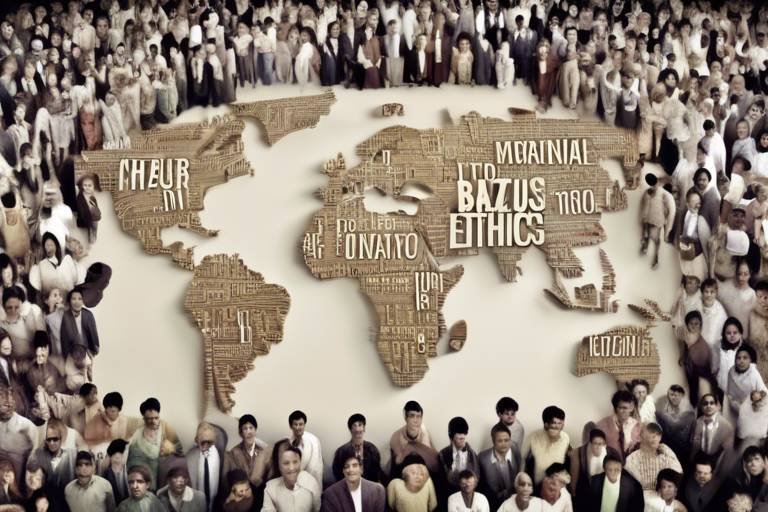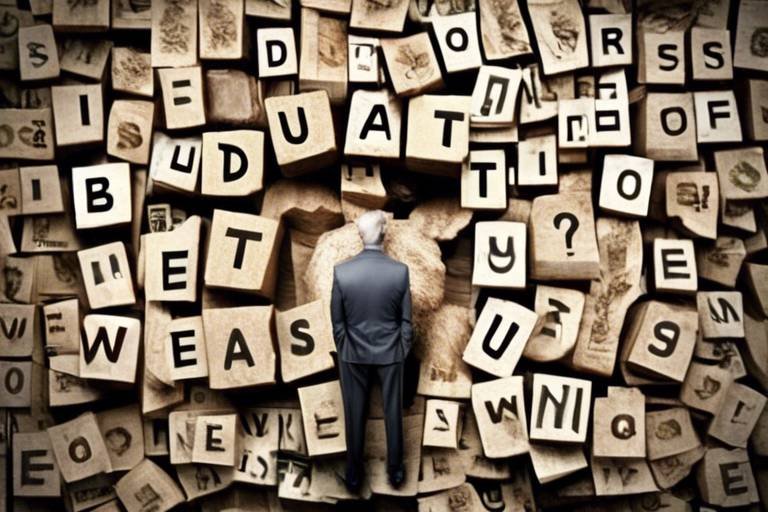Are Double Standards Morally Wrong?
Double standards are a fascinating yet troubling aspect of human behavior that often goes unnoticed until it directly affects us. They represent a contradiction in principles that leads to unequal treatment based on arbitrary factors such as gender, race, or social status. Imagine a world where everyone is treated equally—sounds utopian, right? But when we peel back the layers, we find that double standards are deeply embedded in our society, influencing our interactions, relationships, and even our moral compass.
At the heart of the debate surrounding double standards is a critical question: Are they morally justifiable? This question isn't just philosophical; it has real-world implications that can shape our views on justice, fairness, and equality. For example, when a man is praised for being assertive in the workplace while a woman is labeled as aggressive for the same behavior, we see a stark double standard at play. This inconsistency not only affects individual lives but also perpetuates systemic inequalities that can last for generations.
In essence, double standards challenge the very foundation of what we consider ethical behavior. They create a ripple effect that can distort our perceptions and expectations of one another. As we explore this topic further, we'll uncover how these inconsistencies manifest in various contexts, from gender issues to politics, and how they impact our moral integrity. Are we willing to tolerate a society where fairness is merely a facade? Or should we strive for a world where principles apply equally to everyone, regardless of their background?
Understanding what double standards are is crucial. Essentially, a double standard occurs when different principles are applied to similar situations, leading to unequal treatment. This can manifest in various contexts, such as:
- Gender Inequality: Men and women facing different expectations in the workplace.
- Legal Disparities: Different consequences for similar crimes based on social status.
- Social Norms: Varying reactions to the same behavior based on who is performing it.
To illustrate, consider a scenario where two individuals are caught cheating in a relationship. If one is excused due to their charm while the other faces harsh criticism, we see a clear double standard at work. This inconsistency not only breeds resentment but also questions the integrity of our social frameworks.
Double standards can significantly affect societal norms and behaviors. They shape our perceptions and interactions within different communities, often leading to a culture of inequality and mistrust. When people recognize that certain groups are treated differently, it can foster a sense of injustice and alienation. This can manifest in various ways, including:
- Discrimination: Groups may feel marginalized, leading to social unrest.
- Polarization: Increased division between different societal factions.
- Loss of Trust: Erosion of faith in institutions that uphold justice.
In a society where double standards thrive, the consequences can be dire. They can create an environment where people feel compelled to conform to unfair norms rather than challenge them. This not only stifles individual expression but also hampers collective progress towards a more equitable society.
As we delve deeper into the moral implications of double standards, we must ask ourselves: Can they ever be justified? This section will scrutinize the ethical considerations surrounding double standards, particularly in contexts where justice is at stake. For instance, when examining double standards in legal systems, it becomes evident that unequal treatment can lead to systemic injustices that disproportionately affect marginalized communities.
Moreover, double standards in personal relationships can erode trust and communication. When one partner feels they are held to a different standard than the other, it can create a toxic environment where resentment festers. This challenges the very essence of what it means to have a healthy relationship, leading to emotional turmoil and dissatisfaction.
- What are double standards? Double standards refer to the application of different sets of principles for similar situations, leading to unequal treatment.
- Are double standards always negative? While they often result in unfairness, some may argue that they can serve practical purposes in specific contexts. However, this justification is often contested.
- How can we combat double standards? Raising awareness, promoting open dialogue, and advocating for equality are essential steps in challenging double standards in society.

The Definition of Double Standards
Understanding what double standards are is crucial for grasping their impact on our lives. At its core, a double standard refers to the application of different sets of principles for similar situations, often leading to unfairness and inequality. Imagine a world where the rules change depending on who you are or what group you belong to. This inconsistency can create confusion and resentment, especially when people feel that they are being judged by different criteria than others.
To illustrate this concept, consider the following examples:
- Social Media Behavior: A person may post a controversial opinion online and face backlash, while a friend with a similar opinion might receive praise. This discrepancy highlights how subjective perceptions can lead to double standards.
- Legal System: When two individuals commit the same crime but receive vastly different sentences based on their social status or race, it raises questions about fairness and justice.
- Parenting Styles: Parents may impose stricter rules on daughters than on sons, believing that girls need more protection, which can lead to feelings of inequality among siblings.
Double standards can be found in various contexts, including gender, race, and even professional settings. They manifest in ways that often go unnoticed, creating a ripple effect that influences not just individual lives but also societal norms and values. For instance, in many cultures, men may be praised for being assertive, while women displaying the same behavior might be labeled as aggressive. This disparity not only shapes personal interactions but also affects broader societal dynamics.
In essence, double standards are not just about unfair treatment; they reflect deeper societal biases and can perpetuate stereotypes. They challenge our understanding of fairness and equality, forcing us to question the moral implications of our judgments and behaviors. As we delve deeper into this topic, it becomes essential to recognize how these inconsistencies can undermine trust and lead to systemic issues in various aspects of life.

The Impact of Double Standards on Society
Double standards are like the invisible strings that pull at the fabric of our society, shaping perceptions and behaviors in ways that often go unnoticed. They create a world where the rules seem to change depending on who you are or what group you belong to. Imagine walking into a party where everyone is expected to dress casually, but you notice some guests wearing tuxedos while others are in jeans. That’s the essence of double standards—what’s acceptable for one group isn’t for another, leading to confusion and frustration.
In society, double standards manifest in various ways, affecting everything from personal relationships to broader social norms. For instance, when it comes to issues like crime, we often see different reactions based on the perpetrator’s background. If a wealthy individual commits a crime, they might receive a lighter sentence or even avoid punishment altogether, while someone from a lower socio-economic status faces harsher penalties for similar offenses. This disparity fuels resentment and a sense of injustice among those who feel they are treated unfairly.
Moreover, double standards can significantly impact how communities interact with one another. When certain groups are held to different standards, it creates an environment of mistrust and division. People start to question the fairness of systems meant to protect and serve them. For example, in discussions about law enforcement, minority communities may feel targeted and unfairly treated compared to their counterparts, leading to a breakdown in trust between citizens and the institutions designed to uphold justice.
These inconsistencies also extend to social norms and expectations. Consider the realm of social media, where influencers can often get away with behavior that would be criticized if it were done by an average person. This creates a skewed perception of reality, making it seem like some individuals are above the rules that govern the rest of us. The result? A society that feels increasingly divided, where people are left questioning their worth and place in the social hierarchy.
Furthermore, the impact of double standards can be seen in the realm of education. Students from different backgrounds often face varying expectations and treatment from teachers and administrators. For instance, a student who comes from a wealthy family might receive more leniency for poor grades or behavioral issues, while a less privileged student could be met with harsher consequences. This not only affects academic performance but also shapes self-esteem and future aspirations.
In summary, double standards create a ripple effect that influences every aspect of our lives. They foster inequality, breed resentment, and undermine the very foundations of fairness and justice. Addressing these discrepancies is crucial for building a more equitable society where everyone is held to the same standards, regardless of their background or status. Only then can we hope to create a community where trust and mutual respect flourish.
- What are double standards? Double standards refer to the application of different sets of principles for similar situations, often based on personal biases or societal norms.
- How do double standards affect society? They create inequality, foster mistrust, and lead to division among different groups, ultimately undermining fairness and justice.
- Can double standards be justified? While some may argue that context matters, most ethical frameworks suggest that double standards are inherently unjust and should be addressed.
- What can be done to reduce double standards? Raising awareness, promoting open dialogue, and advocating for equal treatment in all areas of life are essential steps toward reducing double standards.

When we talk about double standards in gender issues, we're diving into a complex web of societal expectations that often dictate how men and women are treated differently. It's like a game where the rules change based on who’s playing, and unfortunately, this game is played out in our everyday lives. For instance, think about how men and women are perceived when they express ambition. A man may be celebrated as a go-getter, while a woman might be labeled as aggressive or bossy. This inconsistency not only affects individual self-esteem but also shapes the broader cultural narrative.
Moreover, these double standards are not just confined to the workplace; they seep into our personal lives as well. Consider the expectations placed on men and women regarding emotional expression. Society often encourages men to be stoic, while women are expected to be nurturing and emotionally available. This dichotomy can create a rift in understanding and communication between genders, leading to frustration and resentment.
To illustrate how pervasive these double standards are, let’s take a look at a few examples:
- Professional Ambition: Men are often praised for their ambition, while women may face criticism.
- Parental Roles: Fathers who take paternity leave are seen as progressive, while mothers are expected to be the primary caregivers.
- Emotional Expression: Men are often discouraged from showing vulnerability, while women are expected to be emotionally expressive.
These examples highlight a troubling reality: double standards not only affect how individuals are treated but also perpetuate stereotypes that can have long-lasting impacts on both genders. When we fail to recognize these discrepancies, we inadvertently endorse a system that values one gender over another, leading to a cycle of inequality that can be hard to break.
In the workplace, these disparities can manifest in hiring practices, promotions, and even salary negotiations. Women often have to work twice as hard to prove their worth, while men may receive opportunities based solely on their gender. This is not just a personal issue; it’s a systemic one that requires collective awareness and action.
Additionally, the implications of these double standards extend to parenting. Parents often unconsciously impose different expectations on their children based on gender. For example, boys might be encouraged to take risks and assert themselves, while girls may be taught to be more cautious and compliant. This not only limits children's potential but also reinforces harmful stereotypes that can follow them into adulthood.
In conclusion, addressing double standards in gender issues is crucial for fostering a more equitable society. By recognizing and challenging these inconsistencies, we can create an environment where both men and women are free to express themselves and pursue their goals without the constraints of outdated stereotypes. It's about time we rewrite the rules of the game, don’t you think?

When we think about the workplace, we often envision a realm where skills, qualifications, and hard work should dictate success. However, the reality can be quite different. Double standards in the workplace can create an environment that undermines these ideals, leading to frustration and disillusionment among employees. Imagine a scenario where two equally qualified candidates apply for the same job, yet one is favored over the other simply because of their gender, age, or even their personal connections. This is not just an isolated incident; it’s a reflection of a broader issue that can permeate corporate culture.
Consider the following scenarios that illustrate double standards in workplace dynamics:
- Hiring Practices: Often, hiring managers may unconsciously favor candidates who fit a certain mold, which can lead to a lack of diversity. For instance, a company may prioritize hiring young, energetic employees while overlooking seasoned professionals who bring invaluable experience.
- Promotion Bias: Promotions can be another area rife with double standards. Studies show that women and minorities often have to prove themselves far more than their counterparts. This can lead to a situation where less qualified individuals ascend the corporate ladder simply because they fit a certain profile.
- Workplace Behavior: The expectations of behavior can also vary significantly. For example, assertiveness in men is often viewed positively, while the same behavior in women can be labeled as aggressive. This discrepancy can stifle the voices of capable individuals who are simply trying to advocate for their ideas.
The implications of these double standards are far-reaching. Not only do they affect individual careers, but they also create a toxic work environment that can diminish overall productivity and morale. Employees who feel undervalued or discriminated against may disengage from their work, leading to higher turnover rates and a loss of talent for the organization.
Furthermore, the impact of double standards can extend beyond the workplace, influencing how employees perceive their value in society. When individuals consistently encounter bias, it can lead to a lack of confidence and self-worth, which can spill over into their personal lives. This cycle of negativity can perpetuate workplace issues, creating a challenging environment for everyone involved.
To tackle double standards effectively, organizations must prioritize transparency and fairness in their policies. This can include implementing unbiased hiring practices, providing training to recognize and combat unconscious bias, and fostering an inclusive culture where every employee feels valued. By doing so, companies can not only enhance their reputation but also improve employee satisfaction and retention.
In conclusion, addressing double standards in the workplace is not just a moral obligation; it’s a business imperative. Organizations that embrace fairness and equality will not only cultivate a positive work environment but will also position themselves as leaders in their industry.

Parenting is one of the most profound responsibilities anyone can undertake, yet it often reveals a stark reality: the existence of double standards. These inconsistencies can manifest in various ways, often leading to unequal treatment of children based on their gender. For instance, many parents might encourage their sons to be adventurous and assertive, while simultaneously urging their daughters to be more reserved and polite. This disparity not only affects children's self-esteem but also shapes their understanding of gender roles from a young age.
Consider the typical scenarios that unfold in many households:
- Curfews: Boys might be allowed to stay out later than girls, even if both are of the same age. This can lead to feelings of unfairness and resentment.
- Chores: Often, daughters may be expected to take on more household responsibilities, while sons might be excused from similar tasks, reinforcing outdated stereotypes.
- Emotional Expression: Boys are often discouraged from showing vulnerability, while girls may be encouraged to express their emotions freely. This can create a rift in how children understand and manage their feelings.
These examples illustrate a broader societal issue where gender biases infiltrate the very fabric of family life. The implications of these double standards can be profound. Children who grow up in environments where they are treated unequally may develop skewed perceptions of fairness and justice, which can carry over into their adult relationships and interactions with the world.
Moreover, the impact of these double standards extends beyond childhood. In adulthood, individuals may find themselves grappling with the expectations that were set during their formative years. For instance, a woman who was taught to prioritize household duties over personal ambitions may struggle to assert herself in her career. Conversely, a man who was encouraged to be assertive may find it challenging to engage in nurturing roles, such as parenting or caregiving.
It's essential for parents to recognize these patterns and actively work to create a more equitable environment for their children. This could mean having open discussions about gender roles, setting consistent expectations regardless of gender, and modeling behavior that promotes equality. By doing so, parents can help dismantle the double standards that have persisted for generations, ultimately fostering a sense of fairness and respect in their children.
Q1: What are double standards in parenting?
A1: Double standards in parenting refer to the unequal treatment of children based on their gender or other characteristics, leading to inconsistencies in expectations, responsibilities, and freedoms.
Q2: How can double standards affect children's development?
A2: They can lead to issues with self-esteem, reinforce harmful stereotypes, and create challenges in adult relationships by instilling a skewed sense of fairness and justice.
Q3: What steps can parents take to avoid double standards?
A3: Parents can promote equality by setting consistent rules for all children, encouraging open dialogue about gender roles, and modeling equitable behavior in their own actions.

When we think about politics, the first thing that often comes to mind is the constant tug-of-war between different ideologies and parties. But what lurks beneath this surface is a troubling reality: double standards. These inconsistencies can shape not only political discourse but also public trust in governance. Imagine a world where a politician's actions are judged not by their merit but by their affiliation or status. This is the essence of double standards in politics, and it can lead to a breakdown of accountability.
For instance, consider the way different political figures are treated in the media. A controversial statement made by a member of one party may be met with outrage and calls for resignation, while a similar statement from another party might be brushed off or even celebrated. This selective scrutiny can create a narrative that favors one side over the other, ultimately skewing public perception. It's like a game of tug-of-war where the rules change depending on who is holding the rope.
Moreover, double standards can also emerge in policy-making. Take, for example, the issue of immigration. Politicians may advocate for strict border controls while simultaneously employing undocumented workers in their own businesses. This hypocrisy not only undermines the integrity of the political system but also alienates constituents who expect fairness and transparency. When leaders fail to uphold the very standards they impose on others, it raises a fundamental question: Can we trust them to lead?
Another area where double standards wreak havoc is in the realm of campaign financing. Wealthy donors can often exert undue influence on political outcomes, yet the average voter struggles to make their voice heard. This disparity creates a system where money talks louder than the will of the people, leading to policies that favor the elite while neglecting the needs of the average citizen. It’s a classic case of “money makes the world go round”, but at what cost to democracy?
To further illustrate these points, let’s take a look at a table comparing the treatment of various political figures based on their actions:
| Action | Party A Response | Party B Response |
|---|---|---|
| Controversial Statement | Calls for resignation | Support and justification |
| Policy Hypocrisy | Criticism and condemnation | Silence or minimal response |
| Campaign Financing | Calls for reform | Defensive stance on donations |
As we can see from the table, the responses can vary drastically depending on the political affiliation of the individual in question. This inconsistency not only breeds cynicism among voters but also fosters an environment where accountability is lost. When politicians are held to different standards based on their party lines, it undermines the very foundation of democracy.
In conclusion, double standards in politics are not just a minor annoyance; they are a significant barrier to achieving true equality and fairness in governance. They can distort public perception, erode trust, and ultimately lead to a disenfranchised electorate. As citizens, we must remain vigilant and demand that our leaders are held to the same standards, regardless of their political affiliations. After all, a fair political system is one where everyone is treated equally, and that is a principle worth fighting for.
- What are double standards in politics? Double standards in politics refer to the inconsistent treatment of similar actions or behaviors based on the political affiliation or status of the individuals involved.
- How do double standards affect public trust? They can undermine public trust by creating perceptions of hypocrisy and favoritism, leading citizens to feel disillusioned with the political system.
- Can double standards be justified? While some may argue that context matters, most ethical frameworks suggest that double standards are inherently unjust and detrimental to fairness.

When we dive into the murky waters of double standards, we begin to unravel a complex web of ethical dilemmas that challenge our notions of fairness and justice. Double standards can often lead us to question the very foundation of our moral beliefs. Are we truly living in a society that values equality, or are we merely paying lip service to the idea while allowing inconsistencies to thrive? The implications of these double standards are profound, affecting not only individuals but also the broader community.
At the heart of the moral implications of double standards is the concept of justice. When certain groups are held to different standards, it raises a crucial question: is justice truly blind? For example, consider the legal system, where similar offenses can lead to vastly different consequences based on the offender's background or social status. This inconsistency can create a sense of disillusionment among individuals who feel that the system is rigged against them. It highlights the need for a more equitable approach to justice, one that does not discriminate based on race, gender, or economic standing.
Moreover, double standards can significantly impact personal relationships. Imagine being in a friendship where one party is allowed to break the rules while the other is reprimanded for the same behavior. This creates a toxic environment that erodes trust and breeds resentment. In romantic relationships, double standards can manifest in expectations regarding fidelity, emotional labor, and even household responsibilities. When one partner is held to a different standard than the other, it can lead to feelings of inadequacy and unfairness, ultimately jeopardizing the relationship's stability.
To illustrate the moral implications of double standards, let’s consider a few scenarios:
| Scenario | Double Standard | Moral Implication |
|---|---|---|
| Workplace Promotions | Men are more likely to be promoted than equally qualified women. | Perpetuates gender inequality and discourages female ambition. |
| Legal Consequences | Wealthy individuals receive leniency for crimes while poorer individuals face harsher penalties. | Undermines faith in the justice system and promotes social division. |
| Parenting Styles | Boys are encouraged to be assertive while girls are taught to be polite. | Reinforces harmful gender stereotypes and limits personal growth. |
These examples serve as a reminder that double standards are not just abstract concepts; they have real-world consequences that affect people's lives. The challenge lies in recognizing these inconsistencies and actively working to address them. It’s essential to engage in open conversations about these issues, allowing for a deeper understanding of how double standards can perpetuate cycles of inequality and injustice.
Ultimately, the moral implications of double standards compel us to reflect on our values and the societal norms we uphold. Are we willing to challenge the status quo and advocate for a fairer world, or will we continue to accept the disparities that exist? The choice is ours, and it requires a collective effort to foster an environment where fairness and equality are not just ideals but realities.
- What are double standards? Double standards refer to the application of different sets of principles for similar situations, often leading to unfair treatment.
- Why are double standards morally wrong? They undermine fairness and equality, creating disparities that can perpetuate injustice and harm relationships.
- How can we address double standards in society? By raising awareness, engaging in discussions, and advocating for policies that promote equality and fairness.
- Can double standards ever be justified? In most cases, double standards are not justifiable as they lead to unequal treatment and discrimination.

When we think about justice, the idea of fairness and equality comes to mind. However, the presence of double standards can significantly skew our understanding of what justice truly means. Imagine entering a courtroom where the scales of justice are tipped, not by the evidence presented, but by the biases that linger in the air. This is the reality for many individuals who find themselves on the wrong side of a double standard, where similar actions are judged differently based solely on the identity of the person involved.
For instance, consider the treatment of defendants in the legal system. Studies have shown that individuals from marginalized communities often face harsher penalties than their counterparts from more privileged backgrounds for similar offenses. This disparity is not just a statistic; it's a reflection of a broader societal issue where race, gender, and socioeconomic status come into play. The following table illustrates some of these disparities:
| Demographic Group | Average Sentence Length | Type of Offense |
|---|---|---|
| White Males | 5 years | Theft |
| Black Males | 10 years | Theft |
| White Females | 3 years | Drug Possession |
| Black Females | 7 years | Drug Possession |
This table is just one snapshot of how double standards can manifest in the justice system. When similar crimes yield vastly different sentences based on the offender's background, it raises a critical question: Is justice truly blind? The answer, unfortunately, seems to be no. This inconsistency not only undermines the integrity of the legal system but also erodes public trust. When people believe that justice is not applied equally, they become disillusioned with the very institutions meant to protect them.
Moreover, double standards in justice extend beyond sentencing. They can also influence policing practices and the treatment of individuals during arrests. For example, studies indicate that people of color are more likely to be stopped, searched, and subjected to excessive force compared to their white counterparts, even when the circumstances are similar. This disparity creates a cycle of mistrust between communities and law enforcement, further complicating efforts to achieve a fair and equitable society.
In personal relationships, these double standards can seep into how we perceive and react to wrongdoing. For example, if a friend lies or betrays trust, the reaction may vary significantly depending on the person's gender or background. Such inconsistencies can lead to feelings of resentment and unfairness, as individuals may feel that their actions are judged through a biased lens.
Ultimately, the question of double standards in justice is not just a legal issue; it is a moral one. It challenges us to reflect on our values and the principles we uphold as a society. Are we willing to confront these uncomfortable truths, or will we continue to turn a blind eye? Addressing double standards is crucial for achieving true justice, as it requires a collective effort to ensure that every individual is treated fairly, regardless of their background.
- What are double standards? Double standards refer to the application of different sets of principles for similar situations, often leading to unfair treatment.
- How do double standards affect justice? They can lead to unequal treatment in legal proceedings, resulting in harsher penalties for certain demographic groups.
- Can double standards ever be justified? While some may argue that context matters, most ethical frameworks advocate for equality and fairness in all circumstances.
- What can be done to combat double standards? Raising awareness, promoting education, and advocating for policy changes are essential steps toward addressing double standards in society.

When it comes to personal relationships, double standards can create a minefield of misunderstandings and emotional turmoil. Imagine a scenario where one partner feels free to go out with friends late at night, while the other is expected to stay home, adhering to a different set of rules. This inconsistency can lead to feelings of resentment and unfairness, as one partner may feel restricted while the other enjoys a sense of freedom. It's a classic case of "what's good for the goose is not good for the gander," and it raises the question: why do we allow these discrepancies to exist in our most intimate connections?
Double standards often manifest in subtle ways, such as the expectations placed on communication and emotional expression. For instance, society often encourages men to be stoic and less expressive, while women are typically allowed to be more emotional and open. This disparity can lead to significant communication barriers in relationships. When one partner feels they cannot express their feelings without being judged or ridiculed, it can create an emotional chasm that is hard to bridge. The result? Increased tension and a breakdown in trust.
Moreover, these double standards can affect how partners perceive each other's actions. If one partner is late to dinner, the other might react differently based on their gender. For example, a man might be forgiven for being late because he was "caught up at work," while a woman might be labeled as irresponsible or inconsiderate for the same behavior. This inconsistency not only breeds resentment but can also lead to a toxic cycle of blame and misunderstanding.
In friendships, double standards can be equally damaging. Think about how often we hear phrases like "boys will be boys" or "she's just being dramatic." These phrases reflect societal norms that excuse certain behaviors based on gender, which can leave individuals feeling isolated or invalidated. When friends hold each other to different standards, it can create an environment where trust is compromised, and genuine support is hard to find.
Ultimately, recognizing and addressing double standards in personal relationships is crucial for fostering healthy dynamics. Open communication is key; partners should feel safe discussing their feelings and expectations without fear of judgment. By creating an environment where both partners can express their needs and concerns, relationships can thrive on mutual respect and understanding.
- What are double standards? Double standards refer to the application of different sets of principles for similar situations, often leading to unfair treatment.
- How do double standards affect relationships? They can create misunderstandings, breed resentment, and erode trust between partners.
- Can double standards ever be justified? While some argue that they can be justified based on cultural or contextual factors, many believe that they ultimately undermine fairness and equality.
- What can I do to address double standards in my relationship? Open and honest communication is essential. Discuss your feelings and expectations with your partner to foster a more equitable dynamic.
Frequently Asked Questions
- What are double standards?
Double standards refer to the application of different sets of principles for similar situations, often leading to unfair treatment. For example, a person might criticize someone for being late but excuse their own tardiness, illustrating a clear inconsistency in expectations.
- How do double standards affect society?
Double standards can create a divide in societal norms, leading to confusion and frustration. When people observe inconsistent behaviors, it can undermine trust and foster resentment within communities, making it difficult to achieve equality and understanding.
- Are double standards common in gender issues?
Absolutely! Gender-related double standards are widespread, affecting both men and women. For instance, women may face judgment for being assertive in the workplace, while men exhibiting similar behavior might be seen as strong leaders. This disparity can hinder progress toward gender equality.
- What impact do double standards have in the workplace?
In professional settings, double standards can result in unequal opportunities for hiring and promotions. For example, a woman might be overlooked for a leadership role due to biases about her ability to balance work and family, while a man in the same position is praised for his dedication.
- How do double standards manifest in parenting?
Parenting often reveals double standards based on gender, where boys and girls are treated differently. For instance, a girl may be discouraged from playing rough sports, while a boy is encouraged to be adventurous. Such disparities can shape their self-esteem and worldview.
- Can double standards affect political discourse?
Yes, political discourse is rife with double standards, which can undermine trust in governance. When politicians apply different rules to themselves than to their constituents, it can lead to a lack of accountability and a feeling of disenfranchisement among the public.
- What are the moral implications of double standards?
The moral implications are significant, as double standards challenge the concept of fairness. They raise questions about justice and integrity, particularly when they result in unequal treatment or systemic injustices, leading to a breakdown of trust in societal institutions.
- How do double standards affect personal relationships?
In personal relationships, double standards can erode trust and communication. For example, if one partner is allowed to stay out late while the other is criticized for doing the same, it can create feelings of resentment and insecurity, ultimately damaging the relationship.



















